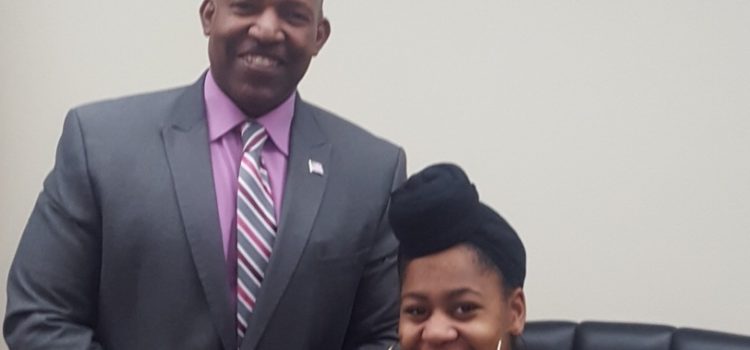
By Ja’Nell Gore
More than a year ago, Lyle Martin took the reigns of the Bakersfield Police Department. Almost immediately, the organization came under scrutiny. The department has been plagued by fallout from years of complaints of alleged civil rights abuses and marred by the actions of two dirty cops who were convicted of stealing drugs from evidence lockers and selling it back on the streets. It all came to a head last year, when the State Department of Justice launched an investigation into alleged civil rights abuses that is ongoing. We sat down with BPD Chief Lyle Martin to discuss his department and where he sees policing going in Bakersfield.
What are your main priorities as your position as chief of police for Bakersfield?
My overarching goal is to remove the two words: ‘and the,’ from the phrase police and the community. To me, that appears to put things in conflict, or that we are not together. The police are the community and the community are the police.
Here organizationally we’re working on the theme is building of a culture of accountability. A culture of accountability starts with me and works all the way through the organization and then out of the organization into the community. Where people are all accountable for their actions and we are all accountable to each other. So that means treating people with dignity and respect, and listening, actively listening — not just listening.
Other counties provide trauma-informed training for police officers so they know how to interact with people with disabilities and non-English speakers. Is that a priority for Kern County?
That is a huge priority for us. What you have is California police officer standard training. So for the academy it is a required learning domain, which is eight hours. We actually put our officers through 40 hours of training, so we train 32 hours over and above the state requirement. Once they’re here we go through more training than that with Kern County Behavioral Health. We have an officer assigned to what we call our high utilizer unit — so people with mental illness, homelessness, those types of thing. They go out and check on those who are chronically either calling police or use our services. We have one officer assigned to that and seven or eight who work with our Mental Health Evaluation Team, and they respond to calls of crisis. So we take the officers who have done that 40 hours of training and they do an additional 40 hours of training, and they respond to these calls they respond with a mental health professional because the officer is to provide security for that mental health professional because sometimes just the uniform showing up can escalate a situation instead of bringing it down. So the officer kind of stands back and lets the mental health provider try to bring things to a calm, and we try to resolve issues that way.
We also have our crisis negotiators who are on our SWAT team. We’ve now implemented them, so they are on patrol, so if something is happening right now and someone from the MET Team is not available, we immediately dispatch them to deal with people that may have mental illness and those types of things.
In our 911 center, we have access to about 28 languages. We also have in-patrol access to translator services, and then in our reporting center, we have interactive, so you can log on and so you speak German. The officer doesn’t speak German, but we can do video monitoring if they have that capability to where someone who speaks German can actually interpret for the officer or the person who’s taking the report. We’ve got a lot of things in place to try and help people with disabilities. We have two officers who are sign language certified.
So this ACLU report came out in November and your agency issued a press release stating that the BPD won’t address the report. What is your response to critics who allege that your agency isn’t being transparent by not addressing this report?
My response to the critics is that they should have read the previous press release. The previous press release is in December of 2016. The Department of Justice initiated an investigation of the Bakersfield Police Department in regards to patterns and practices and in that press release, I was crystal clear that we are going to cooperate with them fully. We are going to give them all of the information, and that they [The DOJ] would do any media or responses to any of those areas that are investigating. The ACLU report took one of those areas and did a report on it. So it would not be appropriate for me to comment on their report when I already said that I won’t do it. It’s not that I’m not being transparent, but it’s not my role at this point.
What is your opinion on body cameras? Do you plan on getting them for BPD officers? Do you think they could be effective?
Yes, body cameras are effective. My position is I am a proponent of body cameras. The hardware is not very expensive, the storage and those types of things are very expensive. I currently have a lieutenant, a sergeant, an officer and a crime analyst researching body cameras from several different perspectives for our department, whether it’s a pilot program or what it would cost to do full-blown body cameras for the entire organization. At some point, we will present that to the city manager and council to see where we can go with that. Body cameras are great, but I have to warn people, it’s not what I call the panacea. It’s not going to solve everything.